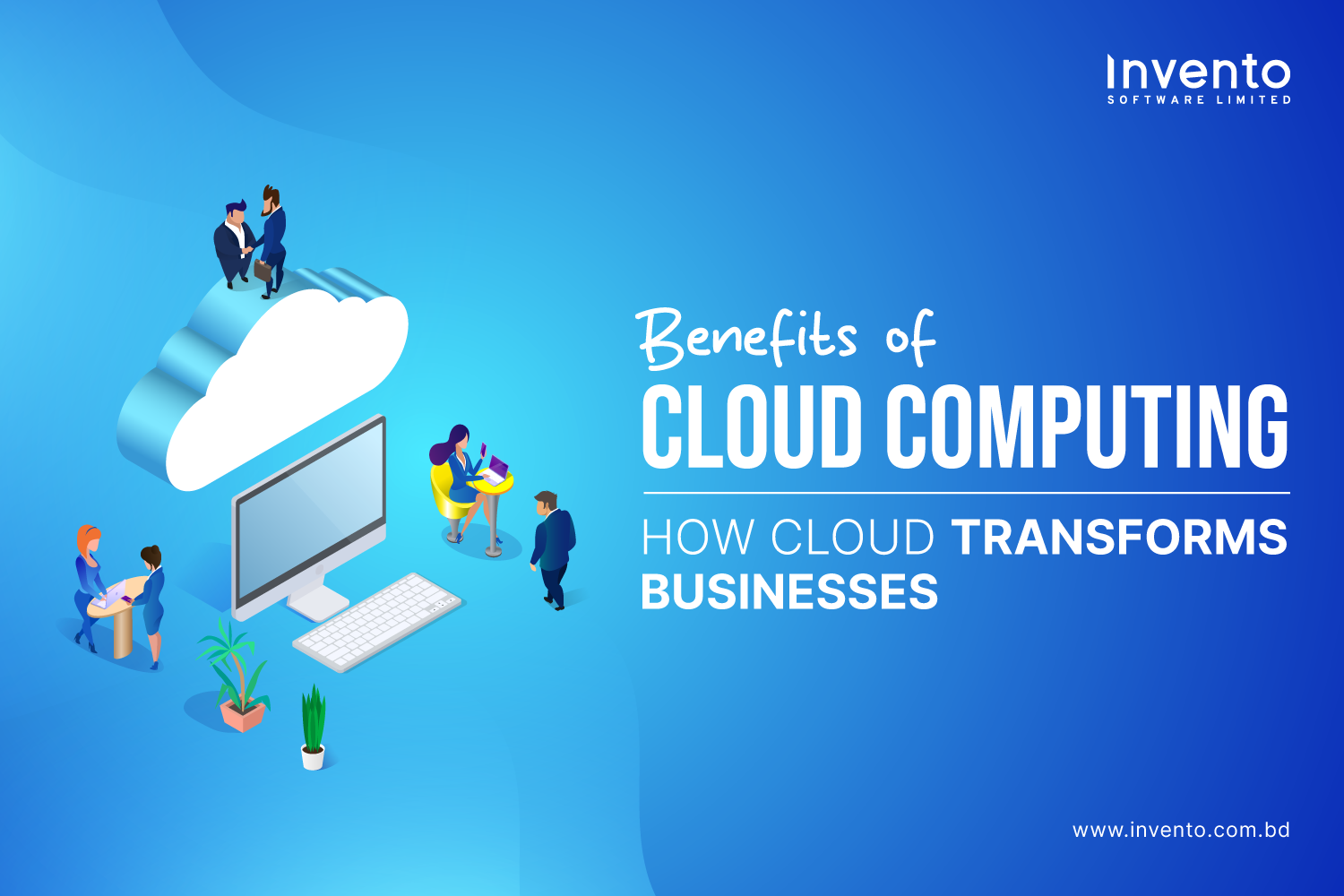Cloud computing has become an essential part of modern technology. From startups to global corporations, and even for personal use, the cloud has transformed the way we work, communicate, and store data. But can you guess why cloud computing is gaining so much attention? Or can you say what makes it so vital in today’s digital era?
In this article, we’ll explore the top benefits of cloud computing, complete with real-life examples, to help you understand why moving to the cloud is no longer optional—it’s essential.
What Is Cloud Computing?
Simply put, cloud computing is the delivery of computing services such as storage, databases, servers, networking, and software over the internet. This means you don’t actually need to store all your files or run applications directly on your computer or office servers.
Imagine it like this:
- Before the cloud: All your files were on your computer. If your device crashed, you could lose everything.
- With the cloud: Your files are stored online and can be accessed anytime, from anywhere, using any device with an internet connection.
Everyday examples include Google Drive, Dropbox, iCloud, and streaming platforms like Netflix. Businesses rely on cloud providers like Amazon Web Services (AWS), Microsoft Azure, and Google Cloud Platform to handle large-scale operations.
The cloud has changed how we store data, run applications, and even interact with technology. Its benefits are vast, making it a critical tool for both businesses and individuals.
1. Cost Savings
One of the most immediate advantages of cloud computing is saving money. Traditional IT systems require buying expensive servers, software licenses, and hiring IT staff for maintenance. Cloud computing eliminates these upfront costs. Most cloud providers operate on a pay-as-you-go model, meaning you only pay for the resources you use.
Example: A small e-commerce business can host its website on AWS instead of purchasing expensive servers. During peak seasons, it can scale up automatically to handle higher traffic. Once traffic drops, the company pays less, avoiding unnecessary costs.
Beyond direct savings, cloud computing reduces hidden expenses like electricity bills, hardware upgrades, and office space for servers. Cloud computing allows even small businesses to access enterprise-level technology without breaking the bank.
2. Flexibility and Scalability
Cloud computing provides unmatched flexibility and scalability. Businesses can increase or decrease resources depending on their needs without additional hardware.
Example: During seasonal sales, online retailers like Amazon can quickly scale their servers to handle millions of visitors simultaneously. After the sale, they scale down automatically, saving money.
This feature also benefits freelancers, students, and home users who can upgrade cloud storage or processing power as needed without permanent investments. The cloud grows with your needs, providing the flexibility to adapt quickly to changes.
3. Remote Accessibility
Remote work has become the norm in the modern workplace, and cloud computing makes it seamless. Employees can access files, applications, and tools from anywhere in the world, as long as they have internet access.
Example: Marketing teams spread across different cities can collaborate in real-time using Google Workspace or Microsoft Teams. Each member can access shared files, make updates, and track progress instantly.
Even individuals benefit from remote access—students can continue assignments from home, and freelancers can manage clients worldwide without being tied to a single location. Location no longer restricts productivity, enabling a truly connected, remote-friendly work environment.
4. Data Backup and Recovery
Data loss can be catastrophic. Traditional systems risk losing data due to hardware failures, theft, or natural disasters. Cloud computing ensures automatic backups and easy disaster recovery.
Example: A photographer storing all their work on Google Drive won’t worry if their laptop crashes. Similarly, businesses can recover vital client data even after a cyberattack or hardware failure.
Many cloud platforms also allow multiple versions of files to be saved, which is particularly useful when collaborating on projects that undergo constant revisions. Cloud computing provides peace of mind, protecting your most important data.
5. Enhanced Collaboration
Collaboration improves dramatically with cloud computing. Multiple users can access and edit files simultaneously, share feedback, and communicate seamlessly.
Example: Students working on group projects can use Google Docs or Microsoft OneDrive to edit documents in real-time. Businesses can create reports, presentations, or spreadsheets collaboratively without emailing multiple versions back and forth.
Cloud tools also integrate with project management and communication software, improving workflow efficiency. Teams work faster, make fewer mistakes, and increase productivity through seamless collaboration.
6. Strong Security
Security is a top concern for any organization. Cloud providers offer advanced security features, including encryption, firewalls, and multi-factor authentication.
Example: Banks use cloud computing to secure financial data and transactions. Similarly, businesses storing customer information can rely on cloud encryption to meet strict compliance regulations.
Cloud providers invest heavily in cybersecurity, often offering better protection than many organizations could achieve on their own. Cloud computing ensures data is safe from unauthorized access, breaches, and other cyber threats.
7. Automatic Updates and Maintenance
Cloud computing reduces IT maintenance burdens. Updates happen automatically, ensuring users always have the latest features.
Example: Microsoft 365 automatically updates apps like Word, Excel, and Outlook through the cloud. Businesses don’t need to manually update each system or hire IT staff for this task.
Guessing the result? Less downtime, smoother performance, and reduced IT workload.
8. Environmental Benefits
Cloud computing is also eco-friendly. By using optimized data centers, it reduces energy consumption compared to running multiple local servers.
Example: Businesses adopting cloud services can significantly lower their carbon footprint. Companies like Google and Microsoft are actively making data centers greener with renewable energy sources.
Cloud computing not only benefits users but also supports sustainability initiatives.
9. Access to Advanced Technologies
Cloud platforms make advanced technologies like Artificial Intelligence (AI), Machine Learning (ML), Big Data, and the Internet of Things (IoT) accessible to businesses of all sizes.
Example: Netflix uses cloud-based AI to recommend shows based on viewing habits. Small businesses can use cloud AI tools to gain insights into customer behavior without expensive infrastructure.
Cloud computing democratizes access to cutting-edge tools, allowing startups and individuals to compete with larger organizations. Advanced technologies are no longer limited to large corporations.
10. Competitive Advantage
Cloud computing helps businesses stay competitive by enabling faster innovation and responsiveness.
Example: Startups can launch applications without investing heavily in servers or IT infrastructure. Cloud computing also allows global expansion without setting up physical offices everywhere.
The cloud provides businesses with agility, helping them adapt, scale, and maintain a competitive edge in a rapidly changing market.
Cloud Computing Across Industries
Cloud computing has revolutionized multiple sectors, offering solutions that improve efficiency, security, collaboration, and customer experience. Let’s take a closer look at how different industries are leveraging cloud technology:
Healthcare
In the healthcare sector, cloud computing is transforming patient care and hospital operations. Hospitals and clinics store patient records securely on cloud servers, allowing doctors and nurses to access medical histories instantly from any device.
During emergencies, cloud-based Electronic Health Records (EHR) systems enable doctors to view lab results, prescriptions, and previous treatments immediately, improving response time and patient outcomes. Telemedicine platforms, powered by the cloud, allow patients to consult specialists remotely, reducing the need for travel and ensuring timely care.
Education
Cloud computing has reshaped how schools, colleges, and universities operate. Platforms like Google Classroom, Microsoft Teams, and Zoom enable teachers to conduct online classes, share study materials, and track student progress in real time.
During the COVID-19 pandemic, educational institutions worldwide switched to cloud-based learning. Students could attend live lectures, submit assignments online, and collaborate with peers virtually, ensuring uninterrupted education. Cloud storage also allows schools to maintain large libraries of digital resources accessible to students anytime.
Finance
Banks and financial institutions use cloud computing to secure transactions, process payments, and detect fraud in real time. Cloud solutions enable secure storage of sensitive data while complying with industry regulations.
Fintech companies use cloud-based analytics to monitor transactions for unusual activity, reducing the risk of fraud. Online banking apps rely on cloud infrastructure to allow users to transfer money, pay bills, and manage accounts safely from anywhere. Investment firms also use cloud computing to analyze market trends and manage portfolios efficiently.
Retail
Cloud computing has transformed the retail sector by enabling businesses to manage inventory, customer data, and online sales efficiently. E-commerce platforms can scale resources automatically to handle spikes in traffic during peak seasons like Black Friday or holiday sales.
Platforms like Amazon, Daraz, and Shopify use cloud servers to ensure their websites remain responsive during high-demand periods. Retailers also use cloud-based analytics to understand customer behavior, track purchases, and create personalized marketing campaigns. Inventory management systems in the cloud help businesses maintain optimal stock levels and reduce losses due to overstocking or stockouts.
Empowering Businesses with Cloud Solutions
At Invento Software Limited, we understand the transformative power of cloud computing for businesses of all sizes. Our team specializes in delivering custom cloud solutions, cloud migration services, and scalable IT infrastructure that help organizations reduce costs, improve efficiency, and stay ahead in a competitive market. Whether it’s implementing cloud-based analytics, enabling secure data storage, or creating cloud-powered applications, Invento Software Limited ensures your business fully leverages the benefits of the cloud. By combining cutting-edge technology with personalized support, we help clients unlock innovation, enhance collaboration, and achieve their digital transformation goals seamlessly.
Final Verdict
Cloud computing is more than just a technology trend—it is essential for growth, efficiency, and innovation. Its benefits, including cost savings, flexibility, security, collaboration, and access to advanced technologies, make it invaluable for businesses, individuals, and organizations worldwide.
Whether you are a business owner, a student, or someone managing personal files, the cloud offers tools that simplify life, enhance productivity, and unlock new opportunities.







